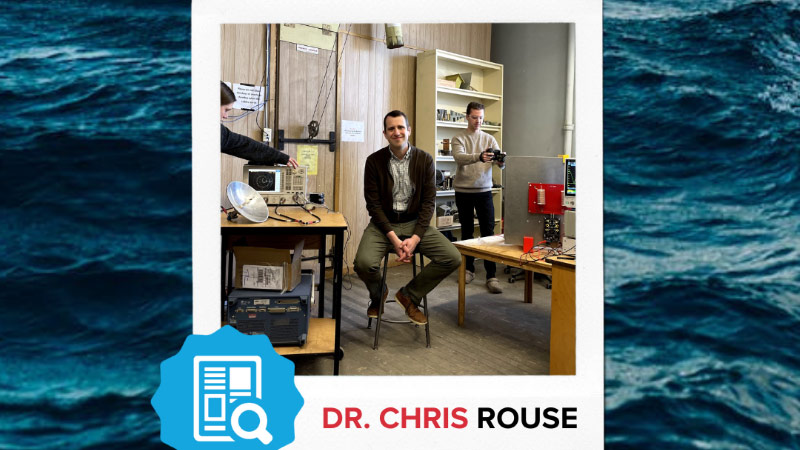Sustainability Research Champion: Dr. Chris Rouse
Author: UNB Sustainability
Posted on Apr 11, 2024
Category: Sustainability Research Champions

Universities play a crucial role in achieving a sustainable future, especially through their research. Considering this, we are excited to highlight individuals and groups at UNB that have dedicated their time to pursuing sustainability-related research.
Our newest Sustainability Research Champion is Dr. Chris Rouse, an Assistant Professor of Electrical and Computer Engineering.
Resonant Capacitive Power Transfer for Clean Transportation Technologies
Overview of your research
Resonant capacitive power transfer (RCPT) has the potential to unlock efficient and cost-effective wireless charging for electric vehicles (EVs) in motion, whether they be passenger or transport vehicles travelling on the highway, public transportation within the city, or robots on a factory floor.
In addition to charging, electromagnetic interaction between transmitter and receiver can be leveraged to wirelessly guide the EV along the path of the electrified roadway, thereby maximizing charging efficiency and facilitating autonomous or assisted driving.
Our research tackles a variety of technical challenges related to electric field coupling effects and high-speed power electronics to achieve this vision.
How does your work intersect with sustainability?
Achieving clean transportation to reduce greenhouse gas emissions is a key element in federal and provincial climate change action plans. EVs are a clear enabling technology in this regard; however, widespread adoption has been hindered by factors such as long charging times, sparse availability of charging infrastructure and the potential electrical hazards associated handling high-power charging cables. Wireless charging addresses all these challenges and inductive chargers for EVs are starting to enter the market.
EVs present their own sustainability challenges due to the added stress on the power grid and significant battery requirements to enable long driving range. Electrified roadways address the latter, providing an opportunity for EVs to charge dynamically while they travel along the highway, thus increasing driving range for a given battery size.
Inductive charging solutions are currently undergoing field trials; however, this technology requires extensive use of ferrite materials and Litz wires to achieve high efficiency. In contrast, RCPT requires only metal plates and solenoids, significantly reducing the cost and environmental footprint associated with a long stretch of electrified roadway. Thus, it can help redefine the way we consume energy to travel.
What impact do you hope this research will have?
As indicated above, it is my hope that this research, combined with technological advancements on the electrical power grid side, will help make the dream of truly clean transportation a reality. I also envision auxiliary functions enabled by the presence of RCPT-based electrified roadways.
The capability of wirelessly guiding vehicles along the track could facilitate safe autonomous driving, particularly on the highway. The sensitivity of RCPT to living tissue could also enable the detection of individuals or wildlife on the road at nighttime and alert drivers to their presence.
Where can people find your work?
My lab is new and does not yet have a website, but our publications within the IEEE (conferences and journals) are steadily growing. They are not open access, but we share accepted versions with UNB for posting on UNB Scholar. Those interested in reading our work can contact me chris.rouse@unb.ca.
Know someone who should be a Sustainability Research Champion? Let us know at sustain@unb.ca.